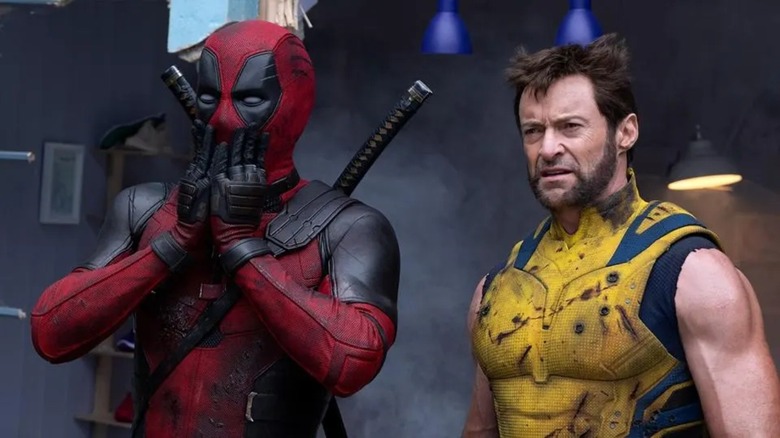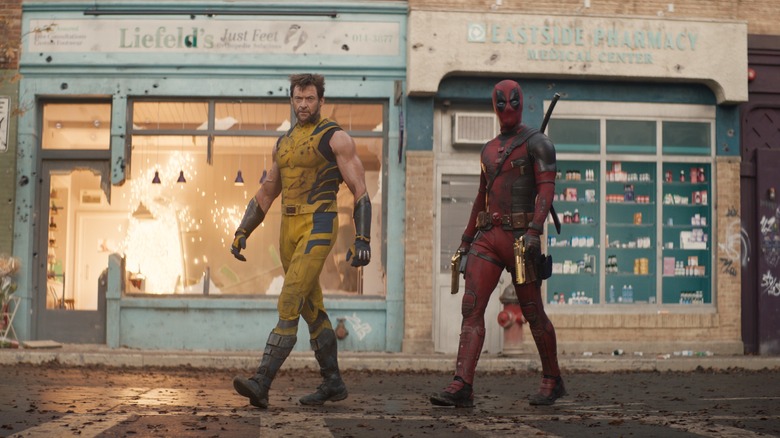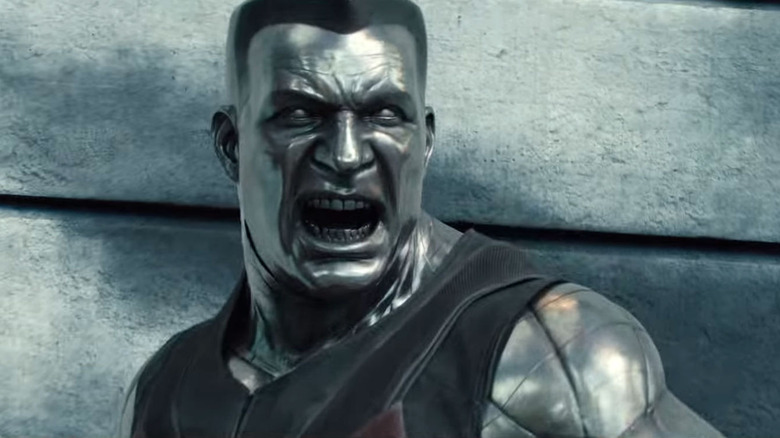Deadpool & Wolverine's Original Like A Prayer Sequence Killed A Beloved Marvel Hero
Near the end of Shawn Levy's popular superhero flick "Deadpool & Wolverine," the two title heroes (Ryan Reynolds and Hugh Jackman, respectively) have to fight their way through a crowd of bloodthirsty alternate Deadpools, each one hailing from a different dimension. In a prolonged sequence, Deadpool and Wolverine slice, stab, shoot, and disembowel their way along a city block, leaving a trail of corpses in their wake. The joke of the sequence, of course, is that most of the Deadpools can't die, as they have regeneration powers. After a lot of energy was expended and the army of Deadpools was killed, they merely stand up again, ready for a second round.
To make the sequence a little more fun, Levy underscored the scene with Madonna's 1989 hit "Like a Prayer," an ironic counterpoint to the bloody mayhem on screen. Also, because very few characters can die in the fight, there's not much at stake, making for a largely empty but certainly enjoyable fight sequence.
It seems that an early draft of the "Like a Prayer" sequence, however, did have some stakes. In the previous two "Deadpool" movies, the iron-skinned mutant Colossus (Stefan Kapičić) became friends with the title hero, serving as a straight man to Deadpool's raucous quipster. Colossus appears briefly in "Deadpool & Wolverine," but only at the beginning, showing that the characters are still friends. It seems there was a version of "Deadpool & Wolverine" wherein Colossus was to step in to motivate Deadpool to start fighting again, but would die in the process. The death of Colossus was to provide motivation for the remainder of the film.
The death of Colossus
Ryan Reynolds laid out his early ideas for the scene in an interview with Collider, explaining that one of the first story ideas for "Deadpool & Wolverine," written in 2020, was that the character wasn't just retired from superherodom, but he had also given up all forms of violence, and has even forsworn swearing. This was meant to be a kinder, gentler version of Deadpool, but to an unnerving degree. Reynolds said that the "new" Deadpool had given over to a creepy, cult-like mentality, and it would be up to his friend Colossus to shake him out of it and get him to turn to violent again.
At some point in "Deadpool & Wolverine," Colossus was to be injured, and, while laying dying on the ground, he would have a final, teary farewell. His final words were to be imploring Deadpool to be filthy again. Reynolds described it like this:
"Anyway, so Deadpool doesn't swear. He's very, very kind of like chaste. And then when Colossus dies in the third act for the same [fight] sequence with "Like a Prayer," he says ... [Remember] in 'Deadpool 2,' as I'm dying on the ground, I do this long, elaborate death ... where I keep coming up with new reasons to not die. And it's exhausting all my friends around me who are sort of saying goodbye. I do a callback where Colossus says, he says, 'Wade, say f*** for me,' as he's lying on the ground, dying."
Tragic. And hilarious.
Major rewrites revamped Colossus' role in the movie
The tragic element of the scene is that Colossus and Deadpool wouldn't have the chance to cuss together. Reynolds continued:
"[It's the] same thing I said to him, you know? And I'm like, 'what, what?' And, you know, I'm emotional. And he says, 'Come on, we'll do it, we'll do it together, you know? On three, come on, here we go. It'll be fine. One, two ...' and I sort of say [silence] and he dies, like before I even can say it."
The script, of course, went through major rewrites since that version of the sequence. At the beginning of "Deadpool & Wolverine," the character had indeed given up on being a superhero, but quickly took up the sword again when violence was required. He also never stopped cussing or making sexual references, and peppers his adventures with many, many f-bombs as he goes. Although one can indeed picture the cathartic moment that would arise when Deadpool, trying to "go straight," as it were, finally broke down and started committing murders again.
Colossus' death might have hit hard for Marvel fans, as the character notoriously died in the comics as well, sacrificing himself to provide a cure for a deadly disease. Colossus, perhaps surprisingly, stayed dead for two whole years before he was resurrected. It seemed, at least for a while, that Colossus would be that rare outlier in comic book lore to remain dead permanently. As we all know, though, no character will stay dead forever.
Well, except for maybe the Human Torch (Chris Evans). That seemed like a pretty permanent death.


